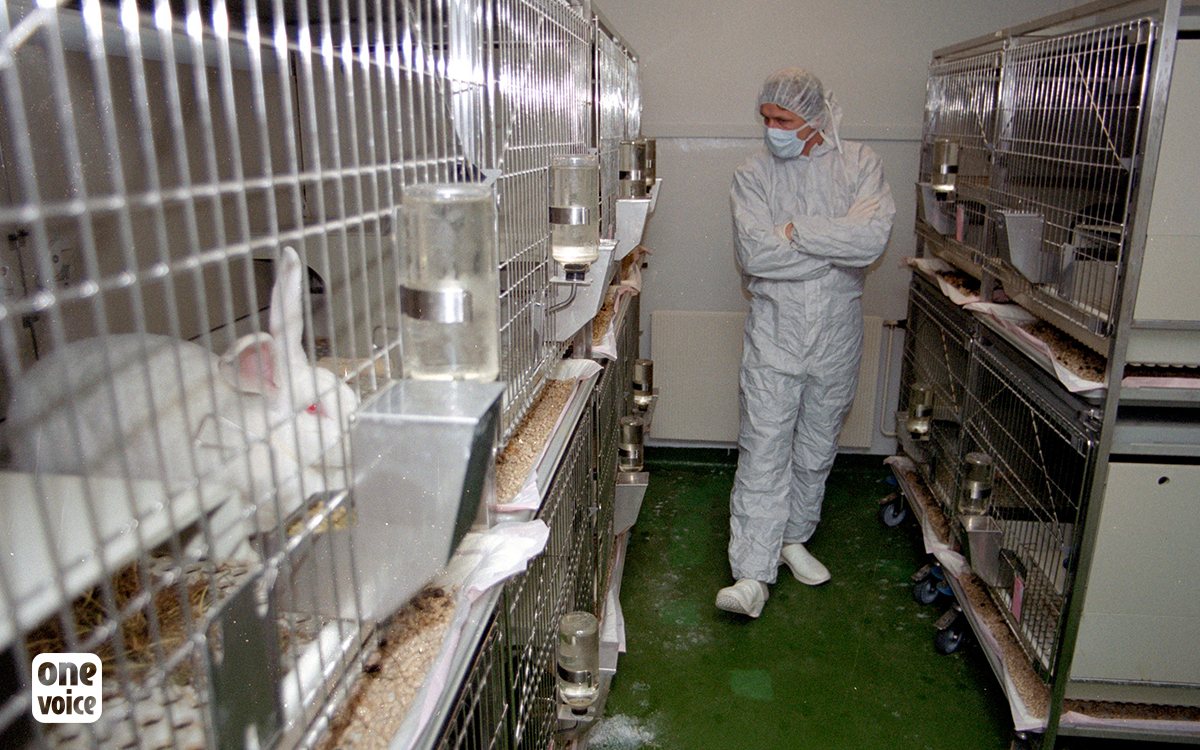
Coronavirus : plus rapide que l’expérimentation animale
Pour l'ECEAE, coalition européenne pour la fin de l'expérimentation animale dont One Voice est le représentant français, l'expérimentation sur les animaux n'est pas la bonne méthode pour obtenir des résultats fiables et rapides contre le COVID-19.
Le coronavirus SARS-CoV-2 est en quelques semaines devenu une pandémie. Nous espérons tous un développement rapide de la vaccination et des antiviraux. Pour l’ECEAE, coalition européenne pour la fin de l’expérimentation animale dont One Voice est le représentant français, l’histoire nous a appris que l’expérimentation animale n’est pas la bonne méthode pour atteindre cet objectif, mais il est dans la nature humaine de répéter les erreurs du passé. Quand le monde réalisera-t-il enfin que les systèmes modèles pertinents pour l’humain doivent être promus et financés de manière adéquate si nous voulons une recherche médicale efficace et rapide ?
C’est un inconvénient bien connu et majeur des expérimentations animales : elles sont lentes – trop lentes en période de pandémie comme celle du SRAS-CoV-2 à laquelle nous sommes actuellement confrontés. Scientifiques et ONG dénoncent depuis longtemps l’inefficacité de la recherche basée sur l’expérimentation animale – en particulier dans le domaine de la modélisation des maladies et du développement de médicaments. En outre, des échanges ont lieu depuis des années avec différents acteurs du monde médical. Les conclusions en sont que des modèles pertinents pour l’humain doivent être établis, optimisés et validés. De nombreux modèles de recherche avant-gardistes sont déjà au point, comme les modèles cellulaires tridimensionnels du poumon humain et du système immunitaire, ou encore les fameux organes sur puce.
Pourtant, le financement de la recherche est largement affecté à des projets recourant à l’expérimentation animale alors que très peu d’argent est investi dans l’optimisation et la mise en place de technologies basées sur l’humain. Il serait sage de déplacer notre paradigme scientifique vers une recherche sans animaux afin de disposer de modèles de recherche pertinents pour notre espèce en prévision des futures pandémies. De tels modèles in vitro sont plus rapides et plus efficaces que la recherche animale car ils ne butent pas contre le problème des différences spécifiques. D’innombrables animaux souffrent actuellement d’expérimentations liées au COVID-19, effectuées dans le but de trouver « le bon modèle animal » pour étudier le virus et ses propriétés infectieuses. Les furets sont maintenant considérés comme un excellent « modèle », car ils sont infectés par le SRAS-CoV-2. Cependant, les furets ne développent aucun symptôme de la maladie tel qu’observé chez les humains, ce qui fait de cette approche une voie sans issue.
Ce type de stratégie est malheureusement établi de longue date : les résultats d’expériences menées sur des animaux et qui ne s’appliqueront probablement jamais aux humains sont présentés au public comme de grandes réussites. D’autres espèces animales sont utilisées pour la recherche sur le COVID-19 bien qu’elles ne soient même pas infectées – les souris par exemple. Les souris génétiquement modifiées précédemment créées pour étudier d’autres virus de type corona, sont maintenant vendues comme des « boîtes à outils » spéciales afin de déterminer si elles peuvent être utiles à la recherche sur le SRAS-CoV-2. D’autres approches prônent le recours aux souris humanisées afin de les rendre sensibles à une infection virale lors de l’insertion de gènes humains dans leur génome. Outre de très faibles chances de succès, de telles tentatives sont contraires à l’éthique et prennent beaucoup de temps. La génération et la reproduction d’animaux génétiquement modifiés réclament des mois. Les expériences in vivo s’étalent sur plusieurs mois ou années et les chances d’obtenir des résultats expérimentaux pertinents pour les humains sont très faibles.
L’histoire nous a enseigné à maintes reprises que les expériences sur les animaux ne sont pas la méthode adéquate pour trouver des vaccins. Elles exigent des années de travail et des coûts s’élevant à des centaines de millions d’euros, voire davantage. Pour de nombreuses maladies virales telles que le VIH, le MERS ou d’autres virus du SRAS, nous n’avons pas réussi à développer de vaccins efficaces à ce jour en dépit d’années de recherches approfondies.
Chaque pandémie, à l’instar de celle qui nous affecte actuellement, est une chance pour les politiques et les décideurs d’apprendre des erreurs passées. La prochaine arrivera tôt ou tard et nous devrons être préparés à l’affronter, armés de modèles de recherche pertinents permettant le développement rapide et fiable de médicaments. Ceci au nom de la sécurité humaine et de tant d’animaux qui souffrent pour une recherche qui ne tient pas ses promesses.
Déclaration commune de l’ECEAE (coalition européenne pour la fin des tests sur les animaux) sur la recherche sur le COVID-19.